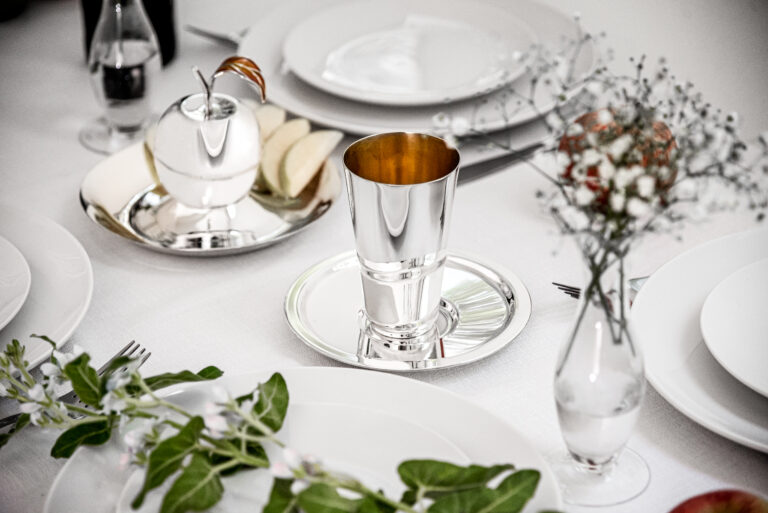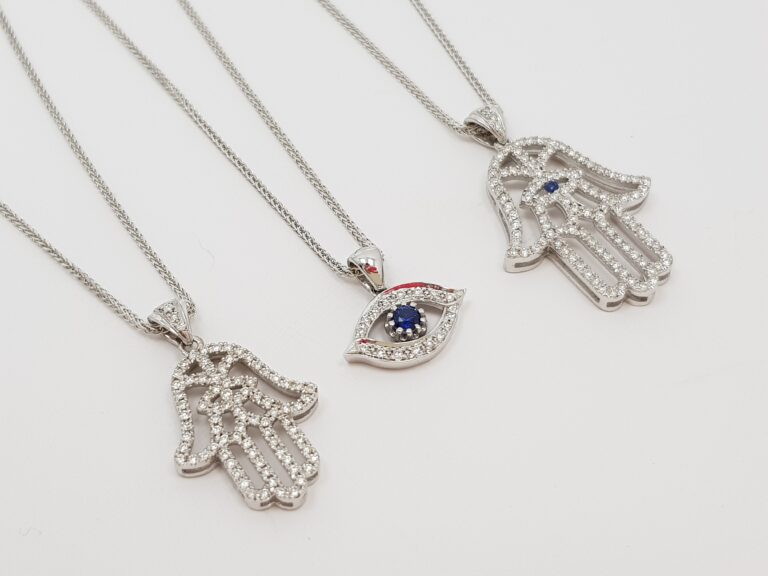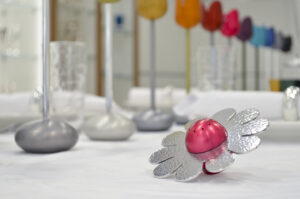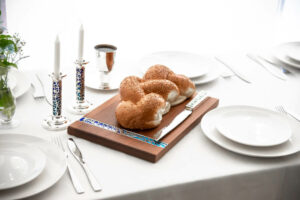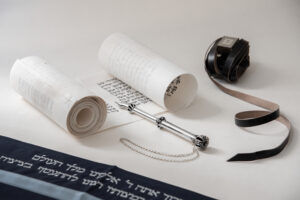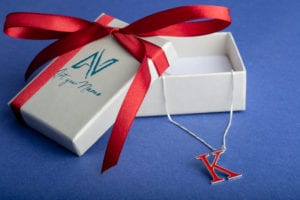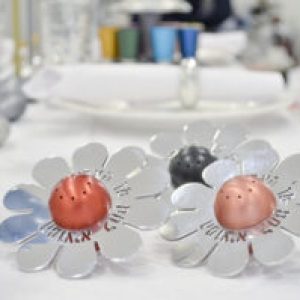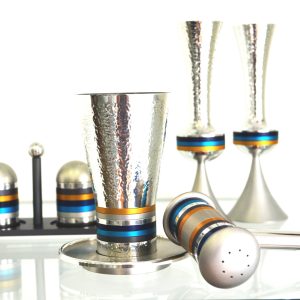Silver is one of the best materials for kiddush cups. Not only is it beautiful, but it has anti-bacterial properties which make it the optimal choice for kiddush cup use. If one would like to know where silver initially came from, he/she might imagine the very first silver mine in history.
There, a man would mine for silver and bring it back to his village. However, later on in history scientists discovered that the human body has bacteria which is called streptococcus mutans, and that this bacteria can dissolve silver. As a result of this discovery, scientists realized that silver was not only antibacterial but also anti-fungal. This means that silver will prevent the growth of bacterium and fungal organisms such as yeast which causes fermentation during Passover (this is why it is forbidden to eat chametz during Passover).
Does Kiddush cup have to be silver?
Since Jews began using kiddush cups, they have been made out of sterling silver. Silver is known as being purer than other metals because it does not corrode or rust.
Silver will last a lifetime if taken care of properly with the best practice tips below. Cleaning with chemicals should be done carefully due to the fact that silver can be damaged by some chemicals, so one must read labels carefully before using any chemical on his/her kiddush cup.
Silver Kiddush cups are usually used as the perfect gift for a Jewish wedding and are usually engraved with family name words of blessing to God and symbols including stars of David, lions, vines, flowers designs which are representative of the Jewish people during ancient times in history. Some also use images such as menorahs and shofars.
Does Kiddush cup have to be 925 Sterling Silver?
The halacha (Jewish law) does not require 925 sterling silver kiddush cups, but the custom is to use sterling silver kiddush cups.
A cup made out of another metal needs to be treated with salt water or alcohol pol after oner it has been used so that there is no residual taste Of the wine from previous times it was used
Best Practice tips when cleaning your Kiddush Cup:
– When washing the Kiddush Cup, wash it by hand. Do not put it in a dishwasher because the chemical process that takes place in the dishwasher can destroy the cup itself and the 14-karat gold plating that is inside that preserves the taste and quality of the wine.
As mentioned before, chemicals can damage the surface of silver which will also make it lose is shinies appearance
– One should not clean silver Kiddush Cups with toothpaste, salt or any other abrasive recipe which contains baking soda and/or cream of tartar because they can all damage the silver.
-Silver Kiddush cups should be washed after each use only with cold water and immediately dry them with a dry towel to avoid staining.
– Do not dry silver Kiddush Cups by putting them on top of a towel because this can cause scratches. Instead, one should dry the cup with a soft cloth and make sure it is completely dry before storage to prevent mildew or tarnish.
What makes a kiddush cup?
A kiddush cup is considered a se’udat mitzvah or a meal in honor of a Jewish holiday or special occasion. The word Kiddush means “sanctification” and the Kiddush Cup is where we sanctify Shabbos, holidays, births and other special occasions through wine ceremonies.
In general, the two critical elements required to make a seder are: 1) One should have enough food for each person at the table to eat an olive-size portion (1/4 Lb.’s). 2) A minimum of 3 full measures of wine should be drunk.
The Rama states that one should use a silver goblet that holds at least 16 oz so that there is enough room for the amount of wine needed to perform a beracha on it.
Kiddush cup requirements a must-watch video
What does Rama mean??
The word Rama comes from the Aramaic language which means “higher” or “elevated” and is referring to the fact that one must say Kiddush while he/she has his/her full faculties. If a person says Kiddush after drinking alcohol, smoking, taking drugs or when they are not completely in their right mind it will not be valid because the purpose of Kiddush is to sanctify and express gratitude for Shabbos and holidays. When saying Kiddush, one should make sure he/she uses up all their senses which was what Moses did when he consecrated the Mishkan (Tabernacle) by using all his senses during prayer; he smelled spices, oil–he touched gold–and heard the shofar.
-The Rama also states that one should wash his hands before using the Kiddush Cup, or at least rince them with water or rinse out a cup and fill it with water and pour over himself/herself before saying the bracha. This is so that there will not be any residual taste from food which may have been consumed previously which will invalidate the blessing made on the wine later on in history when scientists found out that certain bacterium do eat silver.
-When using a Kiddush Cup, one must cover his eyes as he recites this part of prayer because it is representative of seeing G-d’s glory during biblical times when one could

Why use a silver Kiddush cup?
Aluminum at one time was used to make kiddush cups because it is inexpensive but the aluminum cup over time creates an unpleasant taste in one’s mouth, which was not healthy for people to drink from.
The silver kiddush cups would also react to the vine wine in such a way that it created an unhealthy taste in drinking wine.
scientists have discovered that there is a certain bacterium in vine wines that actually eats the aluminum and is the one that will create this bad taste in the mouth from the Kiddush cups that are made from aluminum which does not happen when using a Kiddush cup made of sterling silver or aluminum Kiddush cups which are coated with Teflon inside the cup
For All of our aluminum anodized Kiddush cups are made of Teflon-coated click here
Today, you will find all kiddush cups from sterling silver in most places that are coated with 14k yellow gold in the inside of the cup that preserves the taste of the wine, and for the aluminum/ anodized aluminum Kiddush cups, you will find that most places that care about there customer’s health a Teflon coating on the inside of the kiddush cup Which not also preserves the taste of the wine but mainly preserves your health so that you do not fill your body with unhealthy metals which can cause headaches or even hair loss.
not all Companies coats their kiddush cups on the inside with Teflon or 14k gold in case of sterling silver kiddush cups so please note that this is important for your health and not only for you also for your loved one’s health.
For all of our 925 sterling silver Kiddush cups that are coated with 14k gold click here
What are the laws for washing a kiddush cup?
One must wash his hands before using the Kiddush Cup, or at least rinse them with water or rinse out a cup and fill it with water and pour over himself/herself before saying the bracha. This is so that there will not be any residual taste from food which may have been consumed previously which will invalidate the blessing made on the wine.

Does Kiddush wine have to be red?
The Mishna in Pesachim (90a) states that the wine for Kiddush should be red. The Gemara explains that this refers to black grapes, which are sweet and sour. This makes the wine tasty and pleasant. The Rishonim explain that there were two reasons why black grapes were required: 1) The Gemara mentions that it was only common to use white grapes at the time of the Mishna; hence, one could not have assumed that everyone had a bottle of white wine available for Kiddush on Shabbos night. According to most opinions, this would suffice as a reason to require drinking red wine for Kiddush on Shabbos night. 2) For Kiddush Levanah, we recite a beracha “Shehakol” over the wine. The Gemara in Pesachim (91a) teaches that this beracha should be recited only over a drink that is enjoyable. Since red wine is more enjoyable than white wine, we recite Shehakol over it.
Many people are unaware that they are allowed to say Kiddush over grape juice or any other drink which is not wine, as long as the drink is not mevushal.
If one does not have red wine, he may say Kiddush over grape juice or any other drink that is not mevushal. If he has neither wine nor grape juice, he may recite Kiddush over water.
what can I use instead of kiddush wine?
The Gemara (Pesachim 62b) discusses whether or not one must drink red wine for Kiddush. The Rishonim argue that if one were to drink grape juice instead, this would be considered drinking Kedei Yayin Muktzeh, an act which is forbidden on Shabbos. It is therefore forbidden to use apple or other juices for Kiddush since they are not major beverages.
However, regardless of which opinion one follows, there are many authorities who permit using grape juice for Kiddush if there is a need or if one cannot drink red wine. For example, if one is in the military and stationed on Shabbos in a place where red wine is not available, he may use grape juice for Kiddush. Similarly, if a person is pregnant or nursing, she may use grape juice for Kiddush. Some people also add a small amount of red wine to grape juice in order to fulfill the requirement of drinking red wine for Kiddush.
What kind of kiddush wine should I buy?
Kiddush wines come in either dry table wines or sweet kosher wines. We have found through our experience that the best-quality wines are typically found in the dry table wines because the grape juice used in sweet kosher wine is typically watered down. There are many types of dry table wines to choose from, and the best advice we can give is to read labels carefully and find a wine that you like.
To sum it up for you
If you are interested in buying a Kiddush cup, please note that it is preferable to buy Kiddush cups made out of silver that has been coated with 14k gold on the inside of the kiddush cup because this is not only for your taste it also for your health.
Please also keep in mind that according to Jewish law when washing your hands before reciting Kiddush on Shabbos or Yom Tov you must wash each hand 7 times because this is considered healthy and keeping yourself healthy during prayer keeps you safe.
For our full and rich variety with all the kiddush cups in our variety of different materials click here
